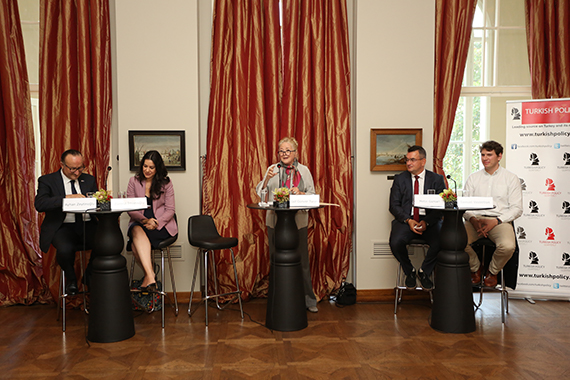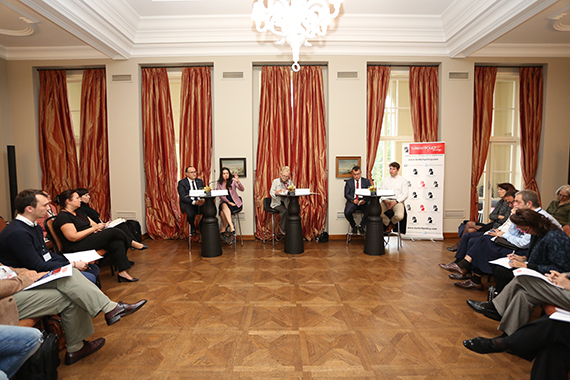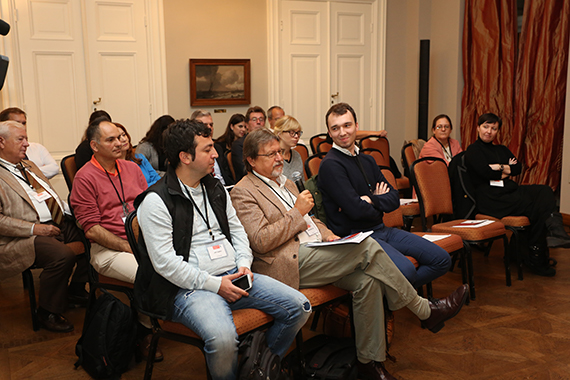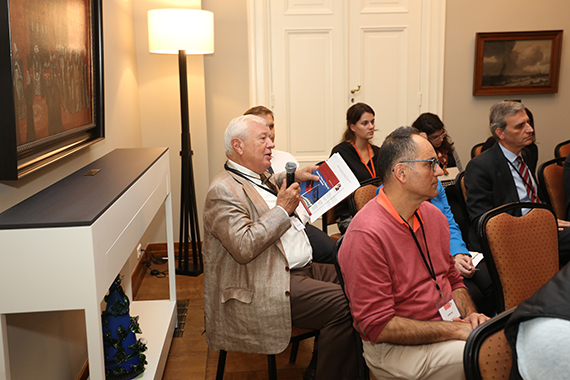On 9 October 2018, Turkish Policy Quarterly (TPQ) held a roundtable discussion titled “Differing Visions for Turkey-EU Engagement” at the Palais de Hollande, which was supported by the Consulate General of the Kingdom of the Netherlands. In conjunction with TPQ’s Spring 2018 issue on the same topic, the conversation revolved around the prospect of a reset of relations between Turkey and the EU and the conditions that need to be met. The newly appointed Ambassador of the Netherlands, Marjanne de Kwaasteniet, provided opening remarks after which the panel discussed a range of issues including the prospect of Customs Union reform, security cooperation dynamics, structural problems of the accession process, and the implications of Turkey’s economic crisis for its relationship with the EU.
The panel featured:
Moderator:
Gül Günver Turan, President, Turkey-European Union Association
Speakers:
Metin Gürcan, Columnist, Al-Monitor
Zümrüt İmamoğlu, Chief Economist, TÜSİAD
Ayhan Zeytinoğlu, President, Economic Development Foundation (IKV)
Samuel Doveri Vesterbye, Managing Director, European Neighbourhood Council (ENC)

In her opening remarks, the newly appointed Ambassador to the Netherlands, Marjanne de Kwaasteniet, noted that her presence marked an important step in Turkey-EU relations following the year and a half vacancy of the post. The Ambassador reasserted the enduring importance of the EU-Turkey relationship, pointing out that the two are partners in trade, security, and migration. The Ambassador expressed her conviction that engagement between the two parties is critical for maintaining a constructive dialogue on Turkey’s reform agenda. In conclusion, the Ambassador stressed that Turkey-EU engagement is rendered even more important given today’s complex security environment.
Our moderator, Professor Gül Günver Turan, President of the Turkey-European Union Association (TURABDER), framed the discussion by talking about the current Turkey-EU landscape. Professor Turan argued that developments within the EU—the lack of visionary leaders and the rise of the far-right—have a significant bearing on how this relationship plays out. Before turning it over to the panel, Professor Turan raised several questions: Are Turkey-EU relations going to remain merely transactional? Will the relationship be viewed outside the framework of accession? Will focusing on narrowly defined issues such as migration, security, and economics benefit us more?

Our first speaker, Ayhan Zeytinoğlu, President of the Economic Development Foundation (IKV), provided an overview of the modernization of the EU-Turkey Customs Union, the topic he wrote about in TPQ’s Spring 2018 issue. Zeytinoğlu asserted that membership to the EU is still an active goal for Turkey, and the prospect should be kept alive as a tool for engagement and an anchor for reforms in the country. Pending accession, Zeytinoğlu argued that a Customs Union revamp is the most plausible mechanism for deeper integration, which would unlock economic benefits for both sides. Furthermore, extending the scope of the Customs Union to cover the agricultural sector, public procurement, and trade in services could stimulate growth in Turkey and the EU, and subsequently revitalize relations more broadly, Zeytinoğlu argued.

Dr. Zümrüt İmamoğlu, Chief Economist at TÜSİAD, focused her talk on Turkey’s economic crisis, as well as its implications for Turkey-EU relations. İmamoğlu argued that initially the political leadership in Ankara focused on a “growth at all costs” approach, however, this resulted in a high external debt—well over 50 percent of the Turkish GDP. Thus, external financing became very important to domestic banks but given political and economic volatility within Turkey, international financing shrunk. As a result, Donald Trump’s threats of imposing sanctions on Turkey sparked an economic crisis that was already coming, explained İmamoğlu. This resulted in a huge spike in exchange rates. Amid tension in the US-Turkey relationship and a worsening currency crisis, Ankara made in-roads to repair its relations with the EU, pointed out İmamoğlu. However, ultimately she argued that the ruling party believes it can overcome the economic crisis on its own. İmamoğlu concluded her talk by urging the government to pursue market-friendly policies.

In discussing security cooperation dynamics between Turkey and the EU, Dr. Metin Gürcan, a security analyst and columnist for Al-Monitor, defined his stance as “very very cautiously optimistic” and the prospect for relations in the next 2-3 years as generally “shaky.” Gürcan laid out four important criteria that need to be reached for a true convergence on security interests between Turkey and the EU: a similar mindset in the field of defense and security; similar threat perceptions; a common understanding of the regional and global security environment; and a common vision for the future. However, several factors have emerged as sticking points, explained Gürcan—particularly in the domains of intelligence sharing, defense industry, and the stance taken towards the PYD and PYG. Furthermore, the crisis over hydrocarbon resources in the eastern Mediterranean raises the specter of conflictual cooperation, pointed out Gürcan. Despite the prevalence of diverging security interests, Gürcan asserted that the Turkey-EU security relationship is far from a zero-sum game, and that the benefits of cooperation outweigh the costs. In finishing his talk, Gürcan implored European diplomats to begin a dialogue and build bridges with conservative and nationalist segments of Turkish society if they want better relations for the future.
Providing the view from Brussels was Samuel Doveri Vesterbye, Head of the European Neighbourhood Council, who elaborated on the article he wrote for TPQ’s Spring 2018 issue, “Preparing for a New Blueprint in EU-Turkey Relations?” First addressing EU countries’ perceptions towards Turkey, Vesterbye explained that they are shaped by various priorities including trade, migration, and energy. Vestberye then addressed what he believes is a dysfunctional accession process due to inbuilt “distorted incentive mechanisms” which germinated back in 2006 when several EU member states moved to block the opening of accession chapters. This led to mistrust on both sides, which factored into election cycles in Turkey and the EU. Notwithstanding the faulty accession framework, Vesterbye opined that areas of mutual interest still exist which can make for a positive EU-Turkey relationship. However, an increase in trust and dialogue channels is essential, emphasized Vesterbye, and furthermore, those channels should be diversified beyond just engaging with Turkey’s opposition.

The lively Q&A session allowed for further reflection on the topics touched upon by the speakers. Participants raised questions such as whether the accession process is still viable, why a lack of trust in intelligence sharing persists between Brussels and Ankara, examples of market-friendly policies the Turkish government can pursue to overcome its economic crisis, and why some EU members oppose a Customs Union update with Turkey. |
